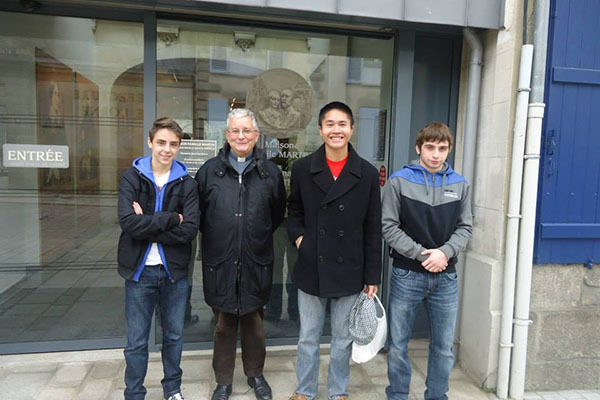
Prinz Jeremy Llanes Dela Cruz is a Junior majoring in French and Francophone Studies. The Nanovic Institute awarded Jeremy a Break Travel and Research Grant for Sophomores and Juniors to conduct research on French Carmelite spirituality. He traveled to France over fall break. Jeremy recently wrote about his experience:
While apostolic religious orders visibly tend the vineyard of the People of God, contemplative branches of consecrated laity remain hidden, laboring for the Church through prayer and penance. The contemplative vocation is characterized by a passion for silence, a devotion of listening for the Lord in a world distracted by the clamor of commercialism and the racket of relativism. In the face of sin, the Carmelite kneels as a model of faith, hope, and love, keeping the tides of temptation at bay and animating the Body of Christ with a pious fervor of divine origin. The Order of Our Lady of Mount Carmel may be considered the most prominent expression of contemplative life, made famous by such holy figures as St. Simon Stock, St. Teresa of Avila, and St. Juan de la Cruz. Over fall break, I was able to enter more deeply into Carmelite spirituality, a discipline steeped with history and vigor, thanks to a Break Travel and Research grant awarded by the Nanovic Institute for European Studies. The primary objective of my project was to explore the lives and teachings of St. Thérése of Lisieux and Bl. Élisabeth de la Trinité, two women who have impacted the Church by their love for the Lord and material detachment. The Little Way of St. Thérése inspires many today to approach the Father with the innocence and trust of a child. Bl. Élisabeth invites others to recognize the Divine Indwelling of the Lord within themselves and to form their daily life around His presence. My ascent to Mount Carmel would take me to the spiritual heights of Lisieux and Dijon and would shed much light on the idea of anéantissement, a concept of the French School of Spirituality which asks the Christian to die to himself in order to rise with Christ.
The city of Le Mans would be my home base for the duration of the week. Its central location between Lisieux and Dijon was invaluable and the presence of the Maison Provinciale of the Congregation of Holy Cross’ Vicariate of France was also fortunate. I was able to stay with the Holy Cross priests and brothers who reside at the administrative house, joining them for meals and sharing in their liturgical life at Notre-Dame-de-Sainte-Croix parish. The following day, I interviewed Fr. Hervé-Marie Cotten, a priest of the Diocese of Le Mans and pastor of St-Aldric parish. Fr. Cotten is an expert on St. Thérése. In order to supplement the biographical information we covered during our discussion of the Little Way, I accompanied Fr. Cotton to Alençon, the hometown of St. Thérése and her family. The Little Flower’s parents, Louis and Zélie Martin, currently have a joint cause for canonization. The old Martin home has been converted into a museum and a shrine to propagate devotion to St. Thérése and her parents. After Alençon, we drove to nearby Lisieux to visit the Basilica of St-Thérése, an international place of pilgrimage for admirers of the Little Flower. I was able to venerate the relics of St. Thérése at the Carmel du Lisieux, where her body rests behind a grille. Having been invited by the Carmelite community of Bl. Élisabeth, I also spent a few days at the Carmel du Dijon in Flavignerot. My time inside Carmel was a period of personal reflection as well as research in the convent’s library of spiritual texts. In addition to experiencing the daily prayer life of the sisters, I interviewed Fr. Conrad de Meester, a Dutch Carmelite priest who is a scholar on Bl. Élisabeth, and Sr. Marie-Michelle de la Croix, O.C.D., a member of the Carmel du Dijon. Fr. de Meester clarified the idea of the Divine Indwelling, an understanding of the Lord’s vibrant presence in each soul, ennobling and transforming it into His sanctuary and one’s anticipated heaven. I was delighted to discover that Bl. Élisabeth may be canonized in the next couple of years and that according to Fr. de Meester, she has the academic legacy to be declared a Doctor of the Church. Ultimately, my experience in a Carmelite convent taught me more about the vitality of silence and the importance of praying from within, lessons I will bring into my own formation as a Holy Cross seminarian.
Through my time in France, I was able to study the relationship of the Little Way and the Divine Indwelling insofar as they are expressions of anéantissement. The Little Way calls for a death to pride while the Divine Indwelling encourages recognition of the Christian’s identity as a sanctuary for the Lord. I was recently accepted into the Honors program of the French and Francophone Studies major and hope to write a thesis regarding the role of anéantissement in the French School of Spirituality. I am grateful for the Nanovic Institute’s generous support of my studies and have benefited greatly from the opportunity to conduct research in Europe.